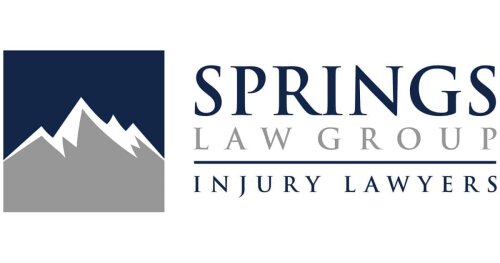
Best Reinsurance Lawyers in Colorado
Share your needs with us, get contacted by law firms.
Free. Takes 2 min.
Or refine your search by selecting a city:
List of the best lawyers in Colorado, United States

About Reinsurance Law in Colorado, United States
Reinsurance is a specialized area of insurance law where insurance companies transfer portions of their risk portfolios to other insurers, known as reinsurers, to reduce their potential losses. In Colorado, reinsurance arrangements are common for managing risk within the vibrant insurance industry, especially during periods of natural disasters or high liability. Reinsurance agreements are highly complex and are governed by a combination of state and federal regulations. Understanding reinsurance law in Colorado requires a grasp of both the regulatory environment and the unique contractual relationships that form the backbone of these transactions.
Why You May Need a Lawyer
There are several reasons why individuals and businesses involved in reinsurance may need legal assistance in Colorado. Common situations include:
- Drafting and reviewing reinsurance contracts to ensure they are legally sound and reflect the intent of the parties
- Disputes between primary insurers and reinsurers regarding claim payouts, coverage interpretations, or contract terms
- Compliance with Colorado Department of Insurance regulations, particularly regarding licensing, reporting, and solvency requirements
- Assistance with audits or investigations initiated by regulatory bodies
- Litigation related to alleged breaches of reinsurance agreements or claims of bad faith
Due to the technical nature of reinsurance and the significant amounts of money at stake, legal guidance is crucial to protect your interests and ensure compliance.
Local Laws Overview
Reinsurance in Colorado is regulated primarily by the Colorado Division of Insurance, operating within the Colorado Department of Regulatory Agencies (DORA). Important aspects of local law include:
- Reinsurer Licensing: Reinsurers must be appropriately licensed or accredited to provide services within Colorado, unless exempted under specific circumstances.
- Contract Regulations: Colorado enforces specific requirements for reinsurance agreements, especially regarding contract terms, dispute resolution provisions, and disclosure standards.
- Solvency Requirements: Reinsurers must meet certain financial criteria to maintain operations in Colorado, ensuring they can pay claims as required.
- Reporting Obligations: Both ceding insurers and reinsurers must comply with annual and quarterly reporting to maintain transparency and protect policyholders’ interests.
- Special Rules for Certain Types of Reinsurance: For life, health, or property and casualty reinsurance, there may be additional regulations or requirements.
- Interstate Compacts and NAIC Guidelines: Colorado often aligns its insurance regulations with model acts and guidelines put forward by the National Association of Insurance Commissioners (NAIC).
Frequently Asked Questions
What is the role of reinsurance in the insurance industry?
Reinsurance allows insurers to manage risk by transferring some of their exposure to other companies. This helps stabilize the insurance market, particularly in times of catastrophic loss or widespread claims.
Who regulates reinsurance in Colorado?
The Colorado Division of Insurance regulates reinsurance activities in the state, overseeing licensing, compliance, and solvency of both domestic and foreign reinsurers.
Do I need a reinsurance lawyer for contract review?
Given the complexity of reinsurance contracts, legal advice is highly recommended to ensure your agreement meets all legal requirements and protects your interests.
What happens if there is a dispute between an insurer and a reinsurer?
Disputes are often resolved through negotiation, mediation, or arbitration, depending on the contract terms. Litigation in court is also possible if other methods fail.
Are all reinsurers in Colorado required to be licensed?
Most reinsurers must be licensed or accredited in Colorado, but there are exceptions, particularly for assuming insurers recognized under NAIC guidelines.
What is assumed reinsurance versus ceded reinsurance?
Assumed reinsurance refers to the portion of risk taken on by the reinsurer. Ceded reinsurance is the risk transferred by the original insurer to a reinsurer.
Does Colorado have unique reinsurance laws?
While much of Colorado's framework aligns with NAIC model laws, the state may impose local requirements, especially regarding licensing and reporting.
How do solvency requirements affect reinsurance companies?
Solvency requirements ensure that reinsurers are financially capable of paying any claims that arise, thus protecting the interests of ceding insurers and policyholders.
What are the reporting obligations for reinsurers in Colorado?
Reinsurers must file annual and, in some cases, quarterly financial statements and comply with other disclosure requirements set by the Division of Insurance.
Can I transfer reinsurance contracts across state lines?
Reinsurance contracts often involve parties from different states. It is essential to comply with applicable Colorado laws and any relevant interstate agreements to avoid regulatory issues.
Additional Resources
For more information about reinsurance laws and resources in Colorado, consider the following:
- Colorado Division of Insurance: The primary regulator for all insurance and reinsurance activities within the state
- National Association of Insurance Commissioners (NAIC): Offers guidance on model regulations and national best practices
- Colorado Bar Association: Provides legal resources and referrals for those seeking help with insurance and reinsurance matters
- Rocky Mountain Reinsurance Society: A regional organization focused on professional development and networking in the reinsurance sector
Next Steps
If you need legal advice or assistance with reinsurance issues in Colorado, here are some recommended steps:
- Document all relevant correspondence, contracts, and communications related to your reinsurance matter
- Research qualified insurance law attorneys or firms with experience in reinsurance matters
- Schedule a consultation to discuss your specific situation, goals, and concerns
- Prepare questions and outline the facts to make the most of your initial legal consultation
- Stay informed about regulatory changes or industry developments that may impact your reinsurance agreements
Addressing reinsurance issues can be complicated, but with the right legal guidance, you can protect your rights and navigate the regulatory landscape with confidence.
Lawzana helps you find the best lawyers and law firms in Colorado through a curated and pre-screened list of qualified legal professionals. Our platform offers rankings and detailed profiles of attorneys and law firms, allowing you to compare based on practice areas, including Reinsurance, experience, and client feedback.
Each profile includes a description of the firm's areas of practice, client reviews, team members and partners, year of establishment, spoken languages, office locations, contact information, social media presence, and any published articles or resources. Most firms on our platform speak English and are experienced in both local and international legal matters.
Get a quote from top-rated law firms in Colorado, United States — quickly, securely, and without unnecessary hassle.
Disclaimer:
The information provided on this page is for general informational purposes only and does not constitute legal advice. While we strive to ensure the accuracy and relevance of the content, legal information may change over time, and interpretations of the law can vary. You should always consult with a qualified legal professional for advice specific to your situation.
We disclaim all liability for actions taken or not taken based on the content of this page. If you believe any information is incorrect or outdated, please contact us, and we will review and update it where appropriate.
Browse reinsurance law firms by city in Colorado
Refine your search by selecting a city.








